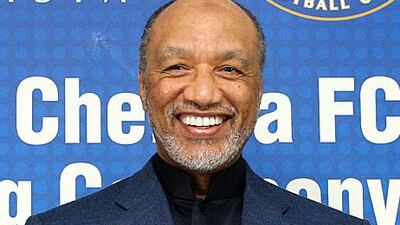Mohamed Bin Hammam has had a good 12 months. And the Qatari president of the Asian Football Confederation (AFC) has seen his international profile soar thanks to his role in securing the 2022 World Cup for his home country, and the successful staging of the Asian Cup in Doha.
The 61-year-old former electrical engineer has also emerged as seemingly the only man capable of standing up to Sepp Blatter, the Fifa president.
When Blatter recently suggested that Qatar might wish to consider moving the World Cup to winter, it was Bin Hammam who insisted the tournament would remain in the summer, with the heat offset by zero carbon, solar-powered cooling technology as promised.
As Fifa's presidential election on June 1 approaches, Bin Hammam is considered a strong candidate to oppose Blatter. He has said he will make his intentions known by Friday, ending months of speculation.
We caught up with bin Hammam last week in Ramallah, where he was on hand to support the Palestinian national team's first competitive match on home soil.
Why did you feel it was important to come to the first home game?
It is a historic moment for Asian football and Palestinian football. I wanted to be a witness to it. It is the first time a match has been organised in the Palestinian territories since the establishment of the AFC in 1954. So I am happy to see the Palestinian footballers now have the chance to play their matches in their own country.
Could this be one of the steps towards Palestine achieving statehood?
Yes, actually. First, I'd like to support the Palestine athletes, especially the footballers, to gain their independence and gain their own character. Through sport we try to overcome the political issues between the Palestinians and the Israelis. I wish we could build bridges between the national associations through this match.
What is the AFC doing to ease the problems that Palestinians have in calling up players who come from Gaza and come to the West Bank?
Palestine is part of our confederation, and Israel is part of Uefa, and we do not have the power to impose the sporting principle on both sides. But we are supporting the Palestinians to try and get their national players to play outside, and also to play within their own territory. Clubs can't come from other countries, like Vietnam [to play in AFC club tournaments like the Champions League]. They cannot play home and away. They are having many problems when they want to play away. And most of the time, there is no reason for this.
Is this a big problem for the AFC, if an AFC team is being restricted from fulfilling its fixtures?
I think we are trying to encourage people to take action. But now with the Palestinians now playing matches in their own territories, much more is happening, and we will be demanding much more than what we used to do in the past. Yesterday I spent one and half hours, two hours at the border. I was delayed for nothing at the border. The Israelis checked our visas and passports. You have someone holding your passport, looking at your face and looking at your passport and looking at your face and looking at your passport. You are there for two hours and for no reason. It's just to tell people they are not welcome to go to Palestine.
Can you now empathise with the problems they face?
Sure. I'm from the Asian Confederation. I'm holding a diplomatic passport. I'm only a football person, and known to be responsible for football and this is the treatment, the way they are dealing with me ... they treat the people who are under the occupation in the same way. Palestine has to, from now on, play all their home matches in Palestine.
What political and social effects do you think Qatar's 2022 World Cup will have on the Middle East?
The vision of Qatar is peace in the Middle East. And when we say peace in the Middle East, Palestine and Israel is an example where we would like to see the World Cup - sport, changing the lives of the two nations. We wish that the people of the Middle East, including the Israelis, realise they are holding something valuable and will come together in a good way. Israelis, Palestinians, Iraqis, Iranians, Afghans.

